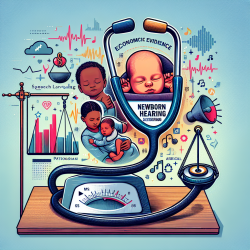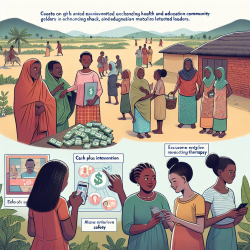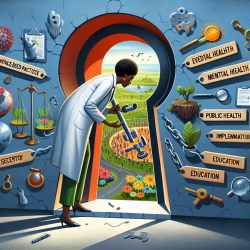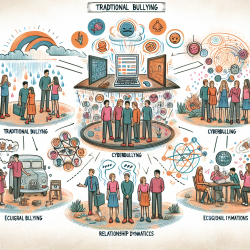As practitioners dedicated to improving outcomes for children, it is crucial to understand the impact of economic evidence on policy adoption, especially in areas like Universal Newborn Hearing Screening (UNHS). The research article "What Contribution Did Economic Evidence Make to the Adoption of Universal Newborn Hearing Screening Policies in the United States?" provides valuable insights that can help us enhance our practice and advocate for evidence-based policies.
The research highlights the role of economic assessments in advancing UNHS policies in the United States. Although formal cost-effectiveness analyses were not decisive, informal economic assessments contributed significantly to the adoption of these policies. This finding underscores the importance of understanding both the direct and indirect economic benefits of early intervention programs.
For practitioners, the following key points from the research can be particularly useful:
- Economic Benefits: Early identification of hearing loss through UNHS can lead to significant economic benefits by reducing the need for special education services. The research estimates a 36% reduction in incremental education costs for children identified early.
- Cost Assessments: The cost of implementing UNHS is modest compared to the long-term savings in educational and social services. The research reports that the average cost per infant screened ranges from $27 to $47, which is offset by the reduction in special education costs.
- Policy Support: Informal economic assessments played a crucial role in garnering policy support for UNHS. By demonstrating the potential cost savings and improved outcomes, stakeholders were able to advocate effectively for the adoption of UNHS policies.
To improve your practice, consider the following actions:
- Stay Informed: Keep abreast of the latest research and economic assessments related to early intervention programs. This knowledge will enable you to advocate for evidence-based policies and practices effectively.
- Advocate for Policies: Use economic evidence to support the implementation of UNHS and other early intervention programs in your community. Highlight the long-term cost savings and improved outcomes for children.
- Collaborate with Stakeholders: Work with policymakers, educators, and healthcare providers to promote the benefits of early identification and intervention. Collaborative efforts can lead to more comprehensive and effective policies.
By understanding and leveraging economic evidence, we can enhance our practice and advocate for policies that improve outcomes for children. For more detailed insights, I encourage you to read the original research paper: What Contribution Did Economic Evidence Make to the Adoption of Universal Newborn Hearing Screening Policies in the United States?










